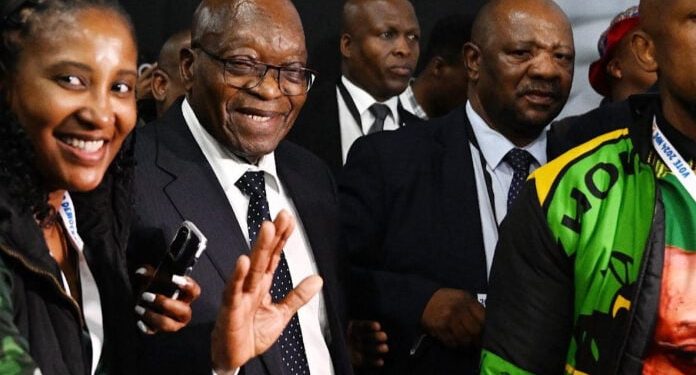In the aftermath of the recent elections, political analyst Mondli Makhanya has issued a stark warning regarding former President Jacob Zuma. Makhanya, known for his incisive critiques, has labeled Zuma a Nkandla yob and cautioned against the former president’s characteristic double-speak.
Zuma, whose presidency was marred by corruption allegations and a controversial relationship with the Gupta family, has remained a polarizing figure in South African politics. Despite his legal battles and the tarnish on his reputation, Zuma retains a substantial following, particularly within his newly formed uMkhonto weSizwe (MK) Party.
In his latest column, Makhanya dissected Zuma’s post-election maneuvers, highlighting the former president’s adeptness at manipulating narratives to suit his agenda. Makhanya pointed out that Zuma’s rhetoric often swings between portraying himself as a victim of political conspiracies and positioning himself as a champion of the underprivileged.
Zuma’s ability to speak out of both sides of his mouth has not diminished with age Makhanya wrote. He has a knack for presenting himself as a martyr while simultaneously orchestrating political strategies that serve his personal interests.
The recent elections saw the MK Party securing a modest but noteworthy presence in Parliament. Zuma’s campaign trail was marked by promises of radical economic transformation and a return to the ideals of the liberation struggle. However, Makhanya argues that these promises are a smokescreen for Zuma’s true intentions.
He talks about economic emancipation, yet his own tenure was characterized by economic stagnation and rampant corruption, Makhanya stated. Zuma’s history shows a pattern of prioritizing personal gain over national interest.
Makhanya critique is not without merit. During Zuma presidency, South Africa experienced significant economic challenges, including high unemployment rates and declining investor confidence. Moreover, the infamous Nkandla scandal, where millions of rands were spent on upgrading Zuma’s private residence under the guise of security needs, remains a vivid example of his administration’s excesses.
In the current political landscape, Zuma’s double-speak poses a threat to stability, Makhanya suggests. By exploiting populist rhetoric, Zuma could further polarize an already divided electorate, potentially leading to increased political volatility.
He presents himself as a man of the people, yet his actions consistently undermine democratic institutions and processes Makhanya warned. The electorate must be vigilant and discerning, recognizing the duplicity in Zuma’s words and deeds.
The analyst also touched upon the broader implications of Zuma’s continued influence. With the MK Party now in Parliament, there is a risk that Zuma faction could push for policies that destabilize the fragile economic recovery South Africa is attempting to achieve.
“Mistrust in the government and democratic institutions is already high Makhanya noted. “Zuma’s presence in the political arena, with his history of manipulation and deceit, can exacerbate this mistrust, hindering progress and reconciliation.
Makhanya warning is clear: South Africa must be cautious of Zuma’s enduring influence and his ability to sway public opinion through double-speak. As the nation navigates the post-election period, recognizing and countering the former president’s tactics will be crucial in maintaining democratic integrity and fostering national unity.






















